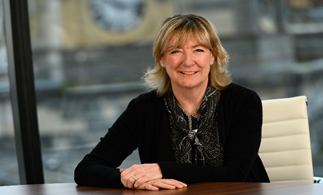Alison has been described as a "leading individual" and as 'one of the best and most experienced lawyers in the field of professional negligence in Scotland'.
In this edition, we learn more about Alison, what advice she has been given and how she enjoys spending her down time.
1. What's the best piece of advice you have been given, both personal and professional, and by whom?
Personally, thinking before you speak. My old art teacher Mrs Avella used to always say, “you don’t have to articulate every thought that comes into your head”.
Professionally, the one touch rule. That means that if you can do something straight away without coming back to it, you should. Don’t waste time touching something twice. This was a lesson learned from a former senior partner of Biggart Baillie who also taught me a valuable lesson –"a lawyer who acts for him/herself has a fool for a client."
2. What has been a work highlight for you over the years?
Being the first female appointed to the Law Society of Scotland Master Policy panel. This is the panel of solicitors that deals with professional negligence claims for solicitors in Scotland. This was a particular highlight to me as it was a highly competitive role which I had to apply for and the relationship is still strong almost 20 years later.
3. How do you like to spend your free time?
Travelling. Particularly in Europe to visit my son and granddaughter who both live in Denmark. I also enjoy spending time in Spain, people watching in local cafes and sketching my surroundings. Art has always been a passion of mine.
4. What is your favourite time of year and why?
Spring. Mainly because I love the spring flowers and the promise of summer. I still have this naive belief that we will have a hot summer in Scotland which, unfortunately, rarely happens.
5. What top tips could you give to clients facing professional indemnity claims?
Professional indemnity claims are, for the professional involved, very stressful and I advise my clients to try and not take it personally. Many professionals will face a professional indemnity claim at some point in their career. It does not mean they are bad at their job. Clients should try and disassociate themselves and it is my job to help them do this and take the heat out of the situation as much as possible.














